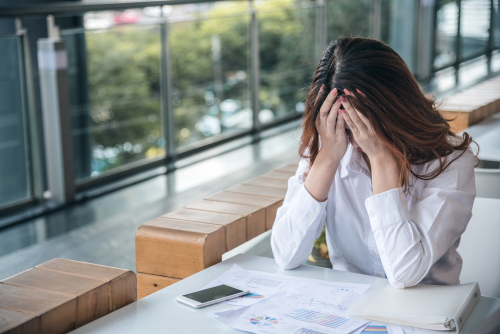There are several outlets people have in order to cope with feelings of anxiety and depression. However, if the behavior becomes obsessive, the outlet can become unhealthy and even exhibit signs of addiction. A few indicators that suggest addictive behavior include indulging in this behavior in secret, experiencing an inability to stop the behavior, and doing so even when it causes harm. Here are six different types of addictions that people may turn to when coping with anxiety and depression.
Gambling
Gambling results in an adrenaline rush and a release of dopamine, which the brain associates with a reward. When this reward is given frequently over an extended period of time, an addiction can occur. Individuals who suffer with a gambling addiction have the inability to control their impulse to gamble, regardless of the consequences. A person may gamble even when they don’t have the extra money to spend, leading to financial issues and an incapacity to meet certain important obligations such as providing for their family or paying off monetary debts.
Video Games
Video game addiction is becoming more and more common and very closely resembles gambling addiction. Gaming can be appealing because it provides an escape from day to day stress that cause feelings of anxiety or depression. However, it can become unhealthy when an individual starts to obsess over gaming, experience a loss of interest in other activities, beings to secretly play video games when they aren’t supposed to, lie about time spent indulging in gaming, and experience a deterioration in personal relationships. Video game addiction can result in issues within social settings and can affect both behavioral and cognitive development in children and adolescents.
Drugs and Alcohol
The effects of drugs and alcohol on the body and brain vary depending on which substance is being abused, but all substance addictions revolve around one’s mental obsession to abuse substances with increasing frequency and quantity. Individuals who suffer from drug or alcohol addiction are highly likely to also suffer from a co-occurring mental health disorder simultaneously, because mood and mind altering substances are effective in masking feelings of anxiety and depression. Individuals addicted to drugs or alcohol may exhibit participation in risky behaviors, be unable to control whether or not they take a substance, and may experience strong cravings for or withdrawals from substances once they stop taking them.
Sex
Sexual activity releases a variety of endorphins in the brain. People typically feel happy and euphoric after sex, so it is understandable why some become addicted to this behavior in an attempt to seek relief from negative emotions. Sex addiction, also known as hyper-sexuality, is indicated by symptoms like a loss over one’s control of sexual urges, persistent and intense sexual fantasies, prolonged amounts of time spent participating in sexual acts, and experiencing trouble with limiting the recurrence of sexual activities. These behaviors may be harmful to the individual, but his or her sexual partners may suffer from this as well if the sexual fantasies become dangerous.
Shopping
Compulsive shoppers may shop when they are under emotional distress because looking for and purchasing items can feel therapeutic. These individuals may spend more money than they can afford, purchase items that they don’t need, and experience a loss of control over the amount they shop or the amount of time they spend shopping. Though shopping may seem harmless, in extreme cases it can actually cause harm to relationships and create financial strain on the person affected and their family.
Exercise
Like sex, feel-good chemicals such as dopamine are released when we exercise. This leads to enhanced mood and energy levels. When an individual becomes addicted to exercise, they begin to associate exercise with joy, and the brain becomes accustomed to this experience. A person who is addicted to exercise my experience symptoms such as an impulsive desire to exercise for long periods of time, failing to participate in important obligations, and having issues managing the amount of exercise they are getting. These symptoms have the potential to be harmful to the body as the person may continue to exercise even if they are in pain or are instructed to stop by a doctor or physician.
Food
Food addictions commonly go untreated because they are hard to diagnose, after all, everybody has to eat in order to live. A food addiction can occur when a person eats compulsively in order to mask negative emotions like depression and anxiety, because eating can result in feelings of control and comfort. An individual who struggles with overeating may hide their eating when in public due to embarrassment, eat significantly large amounts even after they are full, and have an inability to regulate and control the amounts they eat. These behaviors can result in weight gain as well as feelings of shame and isolation.
Final Thoughts: Asking for Help
Asking for help isn’t easy, but it is sometimes necessary for people suffering from an addiction. Regardless of the type of addiction, there are many types of counseling and therapy that an individual can seek out in order to help overcome their addiction. By admitting that they have a problem and speaking with a licensed counselor, the person who is suffering can learn about appropriate coping methods to deal with negative emotions. Learning alternative coping methods is essential so that a person doesn’t have to rely on their addiction to deal with life situations. It is also beneficial to seek help from a support group of others who are struggling with the same kind of circumstances. Support groups provide individuals with a safe place to speak honestly and openly about their addiction while gaining compassion and support from others.

